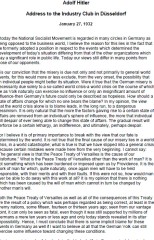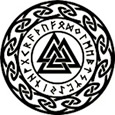
Author : Hitler Adolf
Title : Address to the Industry Club in Düsseldorf January 27, 1932
Year : 1932
Link download : Hitler_Adolf_-_Address_to_the_Industry_Club_in_Dusseldorf.zip
If today the National Socialist Movement is regarded in many circles in Germany as being opposed to the business world, I believe the reason for this lies in the fact that we formerly adopted a position in respect to the events which determined the development of today’s situation differing from that of the other organizations which play a significant role in public life. Today our views still differ in many points from those of our opponents. It is our conviction that the misery is due not only and not primarily to general world events, for this would more or less exclude, from the very onset, the possibility that an individual people might better its situation. Were it true tha t the German misery is necessarily due solely to a so-called world crisis-a world crisis on the course of which we as Volk naturally can exercise no influence or only an insignificant amount of influence-then Germany’s future could only be described as hopeless. How should a state of affairs change for which no one bears the blame? In my opinion, the view that the world crisis alone is to blame leads, in the long run, to a dangerous pessimism. It is only natural that the more the factors gaiving rise to a certain state of affairs are removed from an individual’s sphere of influence, the more that individual will despair of ever being able to change this state of affairs. The gradual result will perforce be a certain lethargy, an indifference, and ultimately, perhaps despair. For I believe it is of primary importance to break with the view that our fate is determined by the world. It is not true that the final cause of our misery lies in a world crisis, in a world catastrophe; what is true is that we have slipped into a general crisis because certain mistakes were made here from the very beginning. I cannot say: “The general view is that the Peace Treaty of Versailles is the cause of our misfortune.” What is the Peace Treaty of Versailles other than the work o f man? It is not something which has been burdened or imposed upon us by Providence. It is the work of man for which, quite naturally, once again men will have to be held responsible, with their merits and with their faults. If this were not so, how would man ever be able to do away with this work at all? It is my opinion that there is nothing which has been caused by the will of man which cannot in turn be changed by another man’s will. Both the Peace Treaty of Versailles as well as all of the consequences of this Treaty are the result of a policy which was perhaps regarded as being correct, at least in the enemy nations, some fifteen, fourteen or thirteen years ago; seen from our vantage point, it can only be seen as fatal, even though it was still supported by millions of Germans a mere ten years or less ago and only today stands revealed in its utter impossibility. Hence, I must conclude that there is some implicit blame for these events in Germany as well if I want to believe at all that the German Volk can still exercise some influence toward changing these conditions. It is, in my opinion, also false to claim that today’s life in Germany is determined solely by considerations of foreign policy; that the primacy of foreign policy today controls the whole of our domestic life. It is naturally possible for a people to reach a point where factors of foreign policy exclusively influence and determine its domestic life. But let no one say that this circumstance is either natural or was intended from the onset. Rather, the important thing is for a people to lay the necessary groundwork to alter this state of affairs. If anyone tells me that foreign politics are the foremost determining factor in the life of a people, then I must first ask: What do you mean by “politics”? There are a number of definitions: Frederick the Great said: “Politics is the art of serving one’s State with every means.” Bismarck stated: “Politics is the art of the possible”-based upon the concept that everything within the realm of possibility should be done to serve the State and, in the subsequent transition to the concept of nationalities, the nation. Yet another considers that this service to the people can be effected by peaceful as well as military means, for Clausewitz said: “War is the continuation of politics, albeit with different means.” Conversely, Clemenceau believed that peace today is nothing other than the continuation of the battle and the pursuit of the battle aim, although, once again, with different means. In short: politics is and can be nothing other than the realization of the vital interests of a people and the practical waging of its life -battle with all means available. Thus it is quite clear that this life-battle has its initial starting point in the people itself, and that at the same time the people is the object, the value in and of itself, which is to be preserved. All of the functions of this body politic should ultimately fulfill only one purpose: securing the preservation of this body in the future. Therefore I can neither say that foreign policy is of primary significance, nor that economic policy has priority. Naturally a people will require an economy in order to live. But this economy is also only one of the functions the body politic requires for its existence. Primarily, however, the most essential thing is the starting point itself, namely the people in and of itself. One should not say that foreign politics are of prime importance in determining the path of a people; rather, one must say that, first of all, it is the people, with its own intrinsic value, with its organization and training in this value, which marks out its own path within the world around it. I should not say that foreign policy is capable of changing the value of the people to any significant extent; rather, I must say: each people must wage the battle to safeguard its own interests and can only wage a battle which corresponds to its innermost nature, its value, its capabilities, the quality of its organization, etc. Naturally, foreign policies will in turn exercise their retrospective influence. We ourselves have experienced it: what a difference there is in the reactions of the individual peoples to foreign policies! The reaction is determined by the inner state of mind, by the inner value, by the inner disposition, by the capabilities of each individual people. Thus I can ascertain that, even if the basic value of a nation is constant, shifts in the inner organization of the life of this nation can suffice to give rise to a change in its attitude to the external world. ...

Tourney Phillip - What I saw that day
Authors : Tourney Phillip F. - Glenn Mark Title : What I saw that day Year : 2011 Link download :...














